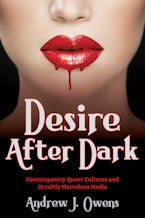- Home
- Desire After Dark
Preparing your PDF for download...
There was a problem with your download, please contact the server administrator.
Desire After Dark
Contemporary Queer Cultures and Occultly Marvelous Media
Published by: Indiana University Press
220 Pages, 6 b&w illus.
- eBook
- 9780253053848
- Published: March 2021
$27.99
Other Retailers:
Since the 1960s, the occult in film and television has responded to and reflected society's crises surrounding gender and sexuality.
In Desire After Dark, Andrew J. Owens explores media where figures such as vampires and witches make use of their supernatural knowledge in order to queer what otherwise appears to be a normative world. Beginning with the global sexual revolutions of the '60s and moving decade by decade through "Euro-sleaze" cinema and theatrical hardcore pornography, the HIV/AIDS crisis, the popularity of New Age religions and witchcraft, and finally the increasingly explicit sexualization of American cable television, Owens contends that occult media has risen to prominence during the past 60 years as a way of exposing and working through cultural crises about queerness. Through the use of historiography and textual analyses of media from Bewitched to The Hunger, Owens reveals that the various players in occult media have always been well aware that non-normative sexuality constitutes the heart of horror's enduring appeal.
By investigating vampirism, witchcraft, and other manifestations of the supernatural in media, Desire After Dark confirms how the queer has been integral to the evolution of the horror genre and its persistent popularity as both a subcultural and mainstream media form.
Acknowledgments
Introduction: Blood, Sulfur, Sex, Magick
1. Aquarian Alternatives: Mid-century Media and the Quest for Occultly Queer Histories
2. Le sexe qui parle du surnaturel: Supernatural Sexualities and Satanic Subcultures in the 1970s
3. The Blood is the Life/Death: Queer Contagion and Viral Vampirism in the Age(s) of HIV/AIDS
4. Now is the time, now is the hour, ours is the magick, ours is the power: Casting as Coming Out in Millennial Media
5. Hold Me, Thrill Me, Kiss Me, Kill Me: The Ambivalent Queer of Occult Cable TV
Epilogue
Index
Andrew J. Owens is Lecturer in the Department of Cinematic Arts at the University of Iowa.
"This is work that insightfully links queer theory and genre theory, and that never sidesteps crucial questions of production, distribution, and reception, all while offering capsule biographies of important players and economical accounts of key historical contexts."
~Noah Tsika, author of Pink 2.0: Encoding Queer Cinema on the Internet
"Over the last several decades, the production of queer-themed horror has boomed, as has queer horror scholarship. This new study begins in the psychedelic (and sometimes Satanic) sixties and ends with an examination of queer horror in 21st-century niche TV. Author Andrew J. Owens deftly weaves contexts of culture, history, and industry in his analyses of texts both canonical (Dark Shadows, The Vampire Lovers) and lesser known (The Craft, Dante's Cove, and the films of Jean Rollin). Highly recommended."
~Harry M. Benshoff, author of Monsters in the Closet: Homosexuality and the Horror Film
"Without diluting the core, revolutionary powers of queer world making, Andrew J. Owens's Desire After Dark expands the horizons of LGBTQ analysis in exciting and unexpected directions. The author aptly incorporates Expressionism and Euro-trash, Satanism and soap opera, Hammer horror and Hear TV into what amounts to a new queer history of western popular culture after World War II. Owens' practice of contextualizing what he calls 'occultly marvelous media' through both cultural history and film analysis is exemplary. Highly recommended."
~Daniel Humphrey, author of Queer Bergman: Sexuality, Gender, and the European Art Cinema and Archaic Modernism: Queer Poetics in the Cinema of Pier Paolo Pasolini
"Owens's Desire after Dark makes clear and important contributions to existing literature on queer theory, media studies, and the horror genre. His insightful, focused study will interest both fans of the TV programs and films examined and scholars in various disciplines who will appreciate how adeptly Owens incorporates well-balanced discussions of culture, industry, genre, reception, and representation in compelling reads of the media re-viewed."
~Richard Wolff, The Journal of Religion, Film, and Media

